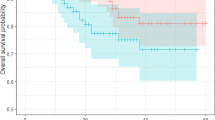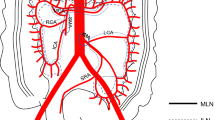Abstract
Background
The lymph node ratio (LNR) was proposed as a prognostic indicator in Stage III colorectal cancer (CRC) patients in recent studies. The purpose of this study was to evaluate the prognostic impact of the LNR in Stage IV CRC patients who have undergone curative resection.
Methods
A retrospective review of 119 Stage IV CRC patients who underwent curative resection in our institute from 1997 to 2009 was performed. Patients were divided into two groups (low LNR and high LNR) by means of their median LNR. A disease-free survival (DFS) and an overall survival (OS) were analyzed using the Kaplan–Meier curve; multivariate analysis was performed using the Cox proportional hazard model.
Results
The cutoff value for the LNR was 0.111. For the entire study group, the 5-year DFS was 22 % and the 5-year OS was 65 %. DFS was not significantly different between patients in the low LNR group and the high LNR group (25 and 19 %, respectively; P = 0.317), but OS was significantly higher in the low LNR group patients compared with the high LNR group patients (77 and 54 %, respectively; P < 0.001). Using multivariate analysis, we identified the LNR as an independent prognostic factor for OS, with a hazard ratio of 3.08 (95 % CI 1.38–8.19; P = 0.005).
Conclusions
LNR is a potent prognostic indicator for stratification in Stage IV CRC patients who have undergone curative resection.

Similar content being viewed by others
References
Engstrom PF, Arnoletti JP, Benson AB, et al. NCCN clinical practice guidelines in oncology: colon cancer. J Natl Compr Canc Netw. 2009;7:778–831.
Ishiguro M, Higashi T, Watanabe T, et al. Changes in colorectal cancer care in japan before and after guideline publication: a nationwide survey about D3 lymph node dissection and adjuvant chemotherapy. J Am Coll Surg. 2014;218:969–77.e1.
Edge SB, Compton CC. The American Joint Committee on Cancer: the 7th edition of the AJCC cancer staging manual and the future of TNM. Ann Surg Oncol. 2010;17:1471–4.
Stillwell AP, Ho YH, Veitch C. Systematic review of prognostic factors related to overall survival in patients with stage IV colorectal cancer and unresectable metastases. World J Surg. 2011;35:684-92.
Yun HR, Lee WY, Lee WS, et al. The prognostic factors of stage IV colorectal cancer and assessment of proper treatment according to the patient’s status. Int J Colorectal Dis 2007;22:1301–10.
Venderbosch S, de Wilt JH, Teerenstra S, et al. Prognostic value of resection of primary tumor in patients with stage IV colorectal cancer: retrospective analysis of two randomized studies and a review of the literature. Ann Surg Oncol. 2011;18:3252–60.
Kotake K, Mizuguchi T, Moritani K, et al. Impact of D3 lymph node dissection on survival for patients with T3 and T4 colon cancer. Int J Colorectal Dis. 2014;29:847–52.
Lu YJ, Lin PC, Lin CC, et al. The impact of the lymph node ratio is greater than traditional lymph node status in stage III colorectal cancer patients. World J Surg. 2013;37:1927–33.
Rosenberg R, Friederichs J, Schuster T, et al. Prognosis of patients with colorectal cancer is associated with lymph node ratio: a single-center analysis of 3,026 patients over a 25-year time period. Ann Surg. 2008;248:968–78.
Sugarbaker PH. Management of peritoneal-surface malignancy: the surgeon’s role. Langenbecks Arch Surg 1999;384:576–87.
Vallicelli C, Cavaliere D, Catena F, et al. Management of peritoneal carcinomatosis from colorectal cancer: review of the literature. Int J Colorectal Dis. 2014;29:895–8.
Mitry E, Fields AL, Bleiberg H, et al. Adjuvant chemotherapy after potentially curative resection of metastases from colorectal cancer: a pooled analysis of two randomized trials. J Clin Oncol. 2008;26:4906–11.
Portier G, Elias D, Bouche O, et al. Multicenter randomized trial of adjuvant fluorouracil and folinic acid compared with surgery alone after resection of colorectal liver metastases: FFCD ACHBTH AURC 9002 trial. J Clin Oncol. 2006;24:4976–82.
Nordlinger B, Sorbye H, Glimelius B, et al. Perioperative chemotherapy with FOLFOX4 and surgery versus surgery alone for resectable liver metastases from colorectal cancer (EORTC Intergroup trial 40983): a randomised controlled trial. Lancet. 2008;371:1007–16.
Ceelen W, Van Nieuwenhove Y, Pattyn P. Prognostic value of the lymph node ratio in stage III colorectal cancer: a systematic review. Ann Surg Oncol. 2010;17:2847–55.
Siegel R, Desantis C, Jemal A. Colorectal cancer statistics, 2014. CA Cancer J Clin. 2014;64:104–17.
Huh JW, Lee WY, Park YA, et al. Prognostic factors associated with primary cancer in curatively resected stage IV colorectal cancer. J Cancer Res Clin Oncol. 2014;140:435–41.
Andreou A, Kopetz S, Maru DM, et al. Adjuvant chemotherapy with FOLFOX for primary colorectal cancer is associated with increased somatic gene mutations and inferior survival in patients undergoing hepatectomy for metachronous liver metastases. Ann Surg. 2012;256:642–50.
Ishihara S, Hayama T, Watanabe T, et al. Prognostic impact of primary tumor resection and lymph node dissection in stage IV colorectal cancer with unresectable metastasis: a propensity score analysis in a multicenter retrospective study. Ann Surg Oncol. 2014; doi: 10.1245/s10434-014-3719-1.
Lee HY, Choi HJ, Park KJ, et al. Prognostic significance of metastatic lymph node ratio in node-positive colon carcinoma. Ann Surg Oncol. 2007;14:1712–7.
Hong KD, Lee SI, Moon HY. Lymph node ratio as determined by the 7th edition of the American Joint Committee on Cancer staging system predicts survival in stage III colon cancer. J Surg Oncol. 2011;103:406–10.
Chen SL, Steele SR, Eberhardt J, et al. Lymph node ratio as a quality and prognostic indicator in stage III colon cancer. Ann Surg. 2011;253:82–7.
Park IJ, Choi GS, Jun SH. Nodal stage of stage III colon cancer: the impact of metastatic lymph node ratio. J Surg Oncol. 2009;100:240–3.
Kobayashi H, Mochizuki H, Kato T, et al. Lymph node ratio is a powerful prognostic index in patients with stage III distal rectal cancer: a Japanese multicenter study. Int J Colorectal Dis. 2011;26:891–6.
Derwinger K, Gustavsson B. A study of lymph node ratio in stage IV colorectal cancer. World J Surg Oncol. 2008;6:127.
Oba M, Hasegawa K, Matsuyama Y, et al. Discrepancy between recurrence-free survival and overall survival in patients with resectable colorectal liver metastases: a potential surrogate endpoint for time to surgical failure. Ann Surg Oncol. 2014;21:1817–24.
Disclosure
All of authors declare no conflicts of interest or financial ties to disclosure.
Author information
Authors and Affiliations
Corresponding author
Rights and permissions
About this article
Cite this article
Ozawa, T., Ishihara, S., Nishikawa, T. et al. Prognostic Significance of the Lymph Node Ratio in Stage IV Colorectal Cancer Patients who have Undergone Curative Resection. Ann Surg Oncol 22, 1513–1519 (2015). https://doi.org/10.1245/s10434-014-4184-6
Received:
Published:
Issue Date:
DOI: https://doi.org/10.1245/s10434-014-4184-6




